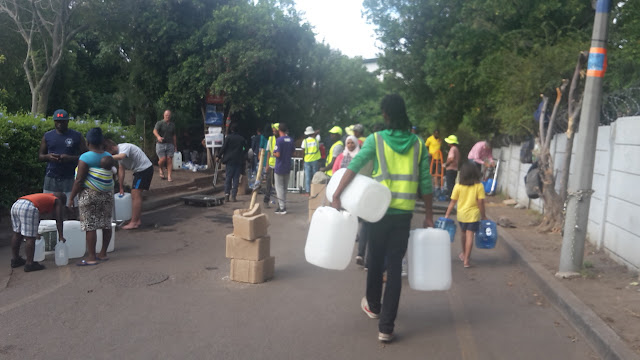A survival guide to Cape Town’s dry metropolitan wilderness
(Tips for tourists to the mother city in the middle of their water crisis)
The city of Cape Town is a top international tourist destination that is suffering a drought so severe it nearly ran out of water altogether. This has had a negative effect on tourism. In the spirit of still visiting a place in less than ideal circumstances (like still-incredible but hurricane-damaged Puerto Rico), I believe there are no good reasons to cancel or delay any travel plans to visit still-beautiful but drought-stricken Cape Town. Though “Day zero” (the day when the taps would run dry), originally scheduled for April, has successfully been diverted for the rest of 2018, the drought is still severe and stringent water restrictions remain in place. Yes, it’s a little inconvenient, but while a lot of people see Cape Town as the ‘Europe of Africa’, it is still Africa, and often, when travelling in Africa, ‘roughing it’ is all part of the experience.
The city of Cape Town is a top international tourist destination that is suffering a drought so severe it nearly ran out of water altogether. This has had a negative effect on tourism. In the spirit of still visiting a place in less than ideal circumstances (like still-incredible but hurricane-damaged Puerto Rico), I believe there are no good reasons to cancel or delay any travel plans to visit still-beautiful but drought-stricken Cape Town. Though “Day zero” (the day when the taps would run dry), originally scheduled for April, has successfully been diverted for the rest of 2018, the drought is still severe and stringent water restrictions remain in place. Yes, it’s a little inconvenient, but while a lot of people see Cape Town as the ‘Europe of Africa’, it is still Africa, and often, when travelling in Africa, ‘roughing it’ is all part of the experience.
So instead of cancelling your travel plans because of the water crisis, we propose that tourists (including people from Joburg like me) just change their perspective on the subject. Visiting Cape Town right now is actually more of an adventure than usual. Think of it like ‘camping’ …if you like camping? It’s like you’re on a safari …in a city-based Airbnb …but without the animals. You’re so hardcore.
So, if you’re ready for an adventure, here are some tips to help you prepare for your 50-litre-a-day-per-person-limit escapade:
“Being prepared is the key to happy camping”
Choose a campsite
It doesn’t really matter where you stay, the limits are the same. If anything, being close to a spring might help.
Familiarise yourself with the campsite rules
If it’s yellow let it mellow… if it’s brown …just avoid the bathroom.
Try to accumulate enough urine to flush it: two birds = one stone.
It’s a pleasure.
…Just kidding, it’s not that bad.
Make sure you are fully prepared before you embark on your journey
And by that I mean: bath before you leave. When you get there, anything more than a 90-second shower is wasteful. And no, that’s not enough time for the water to warm up so you might as well turn off the geyser and save some electricity while you are saving water. If you can afford to miss a shower - like every other day - no one will judge you.
Setting up your campsite
You will need buckets. Whatever you do, do it over a bucket - showering, washing your hands, washing anything - this way you can recycle your grey water for the toilet situation.
Preparing for the elements
It’s always good to pack the right attire. In this case, just pack enough clothes and underwear for the full duration of your stay. You can do laundry when you’re back in a place that has water. Cape Town weather is not the most predictable, so good luck with that!
Planning your meals
Boiling stuff is generally not the best idea. Also, the more dishes you dirty, the more dishes you will have to clean and the more of your limit you will have to waste.
Don’t forget the essentials
Wet wipes are your friend …as are hand sanitiser and dry shampoo.
As the posters suggest "Don't waste a drop", so keep a jar in your purse so that when restaurants deny you free tap water, you can collect your tears. (In their defence, some of them will sell you bottled water at cost price.)
Always wear sunscreen
This has nothing to do with water conservation, it’s just a good idea.
Get innovative
Instead of figuring out how to make fire by rubbing two rocks together, people will be really impressed if you learn how to harvest condensation from the air-conditioning system (if there is one). I know someone who did that!
And finally, make sure you go down to the watering hole to witness and interact with the local fauna in their natural habitat.
This can be interpreted in one of two ways:
1. Some people will tell you “save water, drink wine”. That’s because Cape Town produces great wine and South Africans think alcoholism is funny.
2. What I really mean is: Visit your local spring. There are places where you can collect natural spring water at no charge. If you see a whole lot of cars and people with large plastic water bottles accumulating in an area where Metro police are stationed to monitor the traffic, it’s probably a spring. You can support the local economy by paying someone to help you carry your water bottles (bring your own) and you can even read The Sharonicles while you wait.
Always remember: Camping is meant to be fun, so enjoy yourself. Rain (we wish) or shine, it’s an adventure!”





















No comments